Life Extension Magazine®

Achieving optimal immunity requires balance. While aging robs us of vital immune responses, hyper-immune activity creates its own cast of degenerative diseases.1-3
Autoimmune disorders, gastrointestinal ailments, and allergic and inflammatory conditions are a result of an over-active malfunctioning immune system.
A plant used in Ayurvedic medicine has been shown to modulate the body’s defense mechanisms.4 In one randomized, double-blind human study, up to 54% of participants using this botanical extract experienced symptom relief in just 15 days compared to only 10% in the placebo group.4
Why Immune Modulation is Vital
We tend to think of our immune system as our protector. But in certain cases it can turn against us if it isn’t effectively modulated!
Immune dysfunction is involved in many diseases.5 While infectious diseases can stem from a weak immune response, autoimmune diseases—such as rheumatoid arthritis, nephritis, thyroiditis, and type I diabetes mellitus—are caused by an overly strong immune response. To work efficiently, your immunity needs to be balanced.
Some agents stimulate the immune system and can be used to help combat viral infections, or assist in the treatment of cancer.6,7 Other agents suppress over-active immune responses and help prevent allergic reactions8 or rejection of transplanted organs.9,10
Mainstream medicine often prescribes drugs such as levamisole (Ergamisol®) to increase the function of a patient’s immune system, particularly natural killer cells which are important mediators of antitumor immunity.11,12 In other situations, doctors prescribe drugs such as cyclosporine to decrease the activity of the immune system by interfering with the activity and growth of T cells.13
What is needed is a regulating agent to fine-tune the body’s defenses—that both stimulates and suppresses immune-cell signaling, as needed, to maintain homeostasis within the immune mechanism.
Activating Multiple Cell Signaling Receptors
Scientists seeking an immune optimizer realized that botanical extracts (unlike many drugs) often activate more than one cell signaling receptor, delivering a much broader diversity of effect.14,15
Researchers began investigating medicinal plants that have the dual-action ability to both increase and decrease immunomodulation as needed to create an optimal state of immunity.16 Investigators soon zeroed in on the plant Tinospora cordifolia, long associated with adaptogenic and disease preventive activity.17-19
Tinospora cordifolia has been used in the traditional Indian Ayurvedic System of medicine to both increase immune response against diseases such as malaria, infection, and liver toxicity, and to reduce immune response in cases of inflammation, allergies, arthritis, fever, and diabetes.4,17,19-21
In short, Tinospora cordifolia is able to provide the body with just the right biological modulators to bring it into a balanced, healthy state.
So scientists conducted lab experiments—and later, controlled animal and human studies—to measure the various immune effects of Tinospora cordifolia.
The Right Response at the Right Time
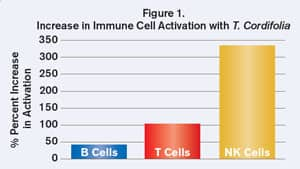
An active immune system can fight the entry of any number of pathogens into the body and has the capacity to prevent exposure to pathogens from actually causing disease. In cell culture studies, extracts of T. cordifolia have been shown to activate several classes of immune cells including B cells by 39%, T cells by 102%, and NK cells by 331%.22
In a lab study, a novel extract of Tinospora cordifolia was found to powerfully activate different types of lymphocytes, which are important immune factors. The scientists found that it increased NK-cell (natural killer cell) activity by a remarkable 331%, T-cell activity by 102%, and B-cell activity by 39%, all of which demonstrates increased immune activity.22 (See Figure 1.)
These observations prompted the study author to categorize this botanical as “exhibiting unique immune stimulating properties.”22
Studies on animals soon followed that demonstrated additional benefits provided by Tinospora cordifolia.
Tinospora cordifolia has been shown to possess potent antioxidant capacity.23,24 One research team pretreated rodents with Tinospora cordifolia prior to an induced heart attack. In the pretreated animals, researchers discovered a dose-dependent reduction in the size of the area of destroyed cardiac tissue (infarct size). Compared to untreated animals, there were decreased lipid peroxide levels in blood and heart tissue.23
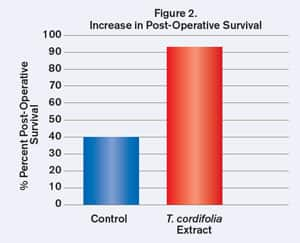
The researchers concluded that strengthening of the immune system by extracts of T. cordifolia may be responsible for considerable improvement in post-surgical outcome. Patients receiving the extract had a 92.4% post-surgical survival rate versus 40% for those not receiving the extract.25
In human studies, Tinospora cordifolia has been shown to protect the liver and modulate the immune system. A randomized, placebo-controlled study of 30 human patients undergoing surgical intervention for malignant obstructive jaundice revealed that pretreatment with Tinospora cordifolia completely prevented septicemia (a life-threatening infection of the blood), normalized the debris removal and killing capacities of the immune system’s white blood cells (neutrophils), and resulted in a postoperative survival rate of 92.4%, compared to just 40% for the control group!25 (See Figure 2.)
To further investigate the findings of preclinical and earlier human studies, scientists launched a randomized, double-blind, placebo-controlled human trial. The goal was to evaluate how Tinospora cordifolia can improve beneficial immune modulation as an adjuvant therapy in surgical treatment of diabetic foot ulcers.
Forty-five patients completed the study trial. Among the treatment group of 23 diabetic foot ulcer patients, phagocytosis—the process whereby the body surrounds and digests foreign bodies and damaged tissue resulting in new healthy growth—was increased an impressive 68% over the placebo group. In addition, there were 23% fewer wound debridements (the removal of damaged tissue) than placebo. Although not statistically significant, other study parameters—such as rate of change of ulcer area, depth and perimeter, and wound severity—showed a promising trend towards improvement.26
What You Need to Know
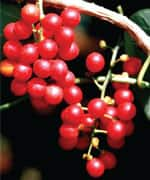 |
Plant Extract Provides Balanced Immune Function
- Without effective modulation, your immune system can cause disease and death by responding too weakly to pathogens or too aggressively to allergens.
- Studies show that Tinospora cordifolia, a plant with a long tradition in Ayurvedic medicine, can modulate the immune mechanism to deliver more appropriate responses.
- A potent extract of this immunomodulatory plant has been shown in placebo-controlled research to beneficially—and safely—regulate immune responses in humans.
- A standardized Tinospora cordifolia extract utilizes cell-to-cell signaling to optimally orchestrate the complex elements of the immune mechanism.
Impressive Confirmation in Humans
To assess the efficacy of a standardized Tinospora cordifolia extract in humans, patients were enlisted who suffered from allergic rhinitis.
Allergic rhinitis is a result of an over-reactive response of the body’s immune system to allergens such as animal dander, foods, house dust, insect venom, and the pollens of grass, weed, and trees. Worldwide, allergic rhinitis affects up to 30% of the population and is increasing in prevalence in Western societies.27,28 Antihistamines, decongestants, and glucocorticoids are commonly prescribed, despite significant risks, in an attempt to lessen the symptoms.
In this trial of 71 patients diagnosed with allergic rhinitis, the test group took 300 mg of a standardized Tinospora cordifolia extract three times daily.4,29
Nasal smears of the test group found markedly reduced levels of eosinophils—immune components that control mechanisms associated with allergies.29 The smears also showed decreased levels of neutrophils, the hallmark of acute inflammation. Researchers found no signs of goblet cells, which produce a substance that mixes with water to produce mucus.29
However, the effect on patient symptoms was even more striking!
Among the subjects taking a standardized Tinospora cordifolia extract:4
- 54% reported complete relief from rhinorrhea (runny nose) vs 10% among the placebo group.
- 42% reported complete relief from nasal obstruction vs 21% among the placebo group.
- 39% reported complete relief from nasal itching vs 24% among the placebo group. (See Figure 3 below.)
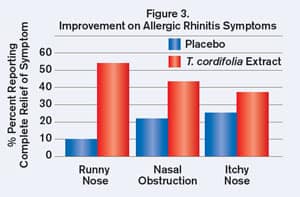
Allergic rhinitis, a condition affecting some 2.1 billion people worldwide, is the result of an over-reactive response of the body’s immune system to allergens. Controlled human studies demonstrate significant improvement of allergic rhinitis symptoms in as few as 15 days.4
And these results were observed after just 15 days!4
Additionally, measurable physical changes were seen in those taking the Tinospora cordifolia extract. Swelling of structures inside the nose involved with air flow, known as nasal turbinates, can result from the persistent inflammation that accompanies allergic rhinitis. There are three turbinates, an upper, a middle, and a lower on each side of the nose.30 Their job is to filter, warm, and humidify air inhaled through the nose.30
In the test group, after 30 days of taking a standardized Tinospora cordifolia extract, the number of participants with enlargement of the lower turbinate dropped by over 40% versus only 9% among the placebo group. Enlargement of the middle turbinate was no longer detectable in any participants taking Tinospora cordifolia extract.
Not only were these remarkable improvements observed promptly—within 15-30 days4—but observations at the 8-week point confirmed that the extract continued to be both effective and safe.29
Considering these remarkable results, there is clearly a safe and natural way to powerfully modulate the immune system to prevent and treat a broad range of chronic diseases!
Orchestrating a Complex Immune System
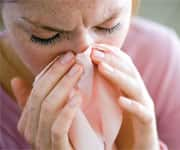 |
- The immune system is a broad collection of players: interacting cells, cell products, and cell-forming tissues that—ideally—protect an organism against disease.
- The key players are located at different points throughout the body: the thymus, spleen, lymph nodes, bone marrow, and even intestinal bacteria.
- These players use an assortment of cellular weapons to contribute to an effective defense: antibodies, which are specialized fighter proteins; T-cells, B-cells, and NK cells, which are lymphocytes that detect antigens and remember antigens they’ve met before; macrophages, which are white blood cells that engulf and digest microorganisms and various antigens; and neutrophils, eosinophils, and basophils, which are white blood cells that generate an inflammatory response.
- At times, our natural immunity can be weak or insufficiently responsive, allowing deadly pathogens to take hold and multiply.
- At other times, the natural immune mechanism can mistake harmless allergens or the body’s own cells for dangerous, microbial pathogens and attack them, turning against the body it is supposed to protect.
- Mainstream medicine has no cure for deficient immunity and often attempts to treat it with antibiotics. These drugs often have dangerous side effects. They can destroy the body’s beneficial intestinal bacteria, leading to bacterial overgrowth and reduced absorption of nutrients—further lowering natural immune function.
- Immune responses start to decline at around 50 years of age due to immunosenescence.
- Similarly, mainstream medicine has no cure for an oversensitive immune system and often tries to suppress the inappropriate immune response with unnatural, immunosuppressive drugs. Aside from dangerous side effects, these drugs lower the body’s healthy response to illness.
- A safe and natural immunomodulator can either upregulate or downregulate the natural immune response as needed.
- An effective immunomodulator is the key to maintaining an immune system that is both strong and properly functioning.
- The medicinal plant Tinospora cordifolia has long been associated in Ayurvedic medicine with anti-disease benefits and immune modulation. It has been used for centuries in India to treat inflammation, arthritis, allergies, and diabetes.
- Scientists have confirmed in studies on both animals and humans the ability of Tinospora cordifolia to safely balance and modulate the immune system.
- It can modulate the body’s immune system to maintain the precise responsiveness, sensitivity, and strength required for an optimized immune response—whether to dangerous microbes or harmless allergens.
Summary
A “strong” immune system isn’t enough to achieve optimal health. An unmodulated immune system—one that is variously underactive and overactive—can be a factor in many diseases, ranging from cancer to diabetes and allergies.
Tinospora cordifolia, a plant with a long tradition in Ayurvedic medicine, has been shown in a number of scientific studies to beneficially modulate the immune system.22,24,26
After formulating a potent extract of this immunomodulatory plant, scientists confirmed in placebo-controlled research its potent ability to regulate immune responses in humans.4
Tinospora cordifolia orchestrates a symphony of cellular activities to maintain the precise responsiveness, sensitivity, and strength required for an optimized immune response—whether to dangerous microbes or harmless allergens.
The components in a standardized extract of Tinospora cordifolia were found to offer significant relief from key symptoms in allergic rhinitis sufferers—in only 15 days!4
If you have any questions on the scientific content of this article, please call a Life Extension® Wellness Specialist at 1-866-864-3027.
References
- Available at: http://www.rightdiagnosis.com/disease/immune.htm. Accessed July 20, 2012.
- Available at: http://www.nhlbi.nih.gov/health/health-topics/topics/aplastic/treatment.html. Accessed July 20, 2012.
- Available at: http://pathmicro.med.sc.edu/ghaffar/hyper00.htm. Accessed July 20, 2012
- Thawani VR, Badar VA, Gharpure KJ, Wakode PT, Hingorani LL. Short term effect of Tinospora cordifolia in allergic rhinitis. The Antiseptic. 2006 April;103(4&P):229-32.
- Kidd P. Th1/Th2 balance: the hypothesis, its limitations, and implications for health and disease. Altern Med Rev. 2003 Aug;8(3):223-46.
- de la Cruz-Merino L, Grande-Pulido E, Albero-Tamarit A, Codes-Manuel de Villena ME. Cancer and immune response: old and new evidence for future challenges. Oncologist. 2008 Dec;13(12):1246-54.
- Powis JE, Raboud J, Ostrowski M, Loutfy MR, Kovacs C, Walmsley SL. The recombinant hepatitis B surface antigen vaccine in persons with HIV: is seroconversion sufficient for long-term protection? J Infect Dis. 2012 May 15;205(10):1534-8
- Pamuk ON, Tsokos GC. Spleen tyrosine kinase inhibition in the treatment of autoimmune, allergic and autoinflammatory diseases. Arthritis Res Ther. 2010;12(6):222.
- Land WG.Future immunosuppression in organ transplantation: treating the innate immune system of the deceased donor-start tomorrow. Exp Clin Transplant. 2012 Jun;10(3):195-208.
- McMahon G, Weir MR, Li XC, Mandelbrot DA. The evolving role of mTOR inhibition in transplantation tolerance. J Am Soc Nephrol. 2011 Mar;22(3):408-15. Epub 2011 Feb 25.
- Holcombe RF, Milovanovic T, Stewart RM, Brodhag TM. Investigating the role of immunomodulation for colon cancer prevention: results of an in vivo dose escalation trial of levamisole with immunologic endpoints. Cancer Detect Prev. 2001;25(2):183-91.
- Anderson, S. Biology of natural killer cells: what is the relationship between natural killer cells and cancer? Will an increased number and/or function of natural killer cells result in lower cancer incidence? J. Nutr. Dec 2005;135(12):2910S.
- Warren RB, Griffiths CE. Systemic therapies for psoriasis: methotrexate, retinoids, and cyclosporine. Clin Dermatol. 2008 Sep-Oct;26(5):438-47.
- Schrattenholz A, Groebe K, Soskic V. Systems biology approaches and tools for analysis of interactomes and multi-target drugs. Methods Mol Biol. 2010;662:29-58.
- Wang Y, Fan X, Qu H, Gao X, Cheng Y. Strategies and techniques for multi-component drug design from medicinal herbs and traditional chinese medicine. Curr Top Med Chem. 2012 Jun 1;12(12):1356-62.
- Spelman K, Burns J, Nichols D, Winters N, Ottersberg S, Tenborg M. Modulation of cytokine expression by traditional medicines: a review of herbal immunomodulators. Altern Med Rev. 2006;11(2):128-50.
- Sharma U, Bala M, Kumar N, Singh B, Munshi RK, Bhalerao S. Immunomodulatory active compounds from Tinospora cordifolia. J Ethnopharmacol. 2012 Jun 14;141(3):918-26. Epub 2012 Mar 26.
- Manjrekar PN, Jolly CI, Narayanan S. Comparative studies of the immunomodulatory activity of Tinospora cordifolia and Tinospora sinensis. Fitoterapia. 2000;71:254-7.
- Upadhyay AK, Kumar K, Kumar A, Mishra HS. Tinospora cordifolia (Willd.) Hook. f. and Thoms. (Guduchi) – validation of the Ayurvedic pharmacology through experimental and clinical studies. Int J Ayurveda Res. 2010 Apr-Jun;1(2):112–121.
- Wadood N, Wadood A, Shah SA. Effect of Tinospora cordifolia on blood glucose and total lipid levels of normal and alloxan-diabetic rabbits. Planta Medica. 1992;58:31-136.
- Sharma V, Pandey D. Protective Role of Tinospora cordifolia against lead-induced hepatotoxicity. Toxicol Int. 2010 Jan;17(1):12-7.
- Nair PKR, Rodrigueza S, Ramachandran R, et al. Immune stimulating properties of a novel polysaccharide from the medicinal plant Tinospora cordifolia. Int Immunopharmacol. 2004;4:1645-59.
- Rao PR, Kumar VK, Viswanath RK, Subbaraju GV. Cardioprotective activity of alcoholic extract of Tinospora cordifolia in ischemia-reperfusion induced myocardial infarction in rats. Biol Pharm Bull. 2005;28(12)2319-22.
- Desai VR, Kamat JP, Sainis KB. An immunomodulator from Tinospora cordifolia with antioxidant activity in cell-free systems. Proc Indian Acad Sci. 2002;114:713-9.
- Rege N, Bapat RD, Koti R, Desai NK, Dahanukar S. Immunotherapy with Tinospora cordifolia: a new lead in the management of obstructive jaundice. Indian J Gastroenterol. 1993 Jan;12(1):5-8.
- Purandare H, Supe A. Immunomodulatory role of Tinospora cordifolia as an adjuvant in surgical treatment of diabetic foot ulcers: a prospective randomized controlled study. Indian J Med Sci. 2007 Jun;61(6):347-55.
- Purkey MT, Smith TL, Ferguson BJ, et al. Subcutaneous immunotherapy for allergic rhinitis: an evidence based review of the recent literature with recommendations. Int Forum Allergy Rhinol. 2013 Jan 11. doi: 10.1002/alr.21141. [Epub ahead of print]
- Available at: http://www.aaaai.org/about-the-aaaai/newsroom/allergy-statistics.aspx. Accessed July 23, 2012.
- Badar VA, Thawanib VR, Wakodec PT, et al. Efficacy of Tinospora cordifolia in allergic rhinitis. J Ethnopharmacol. 2005;96:445-9.
- Available at: http://www.hopkinsmedicine.org/sinus/sinus_conditions/how_the_sinuses_work.html. Accessed July 30, 2012.

